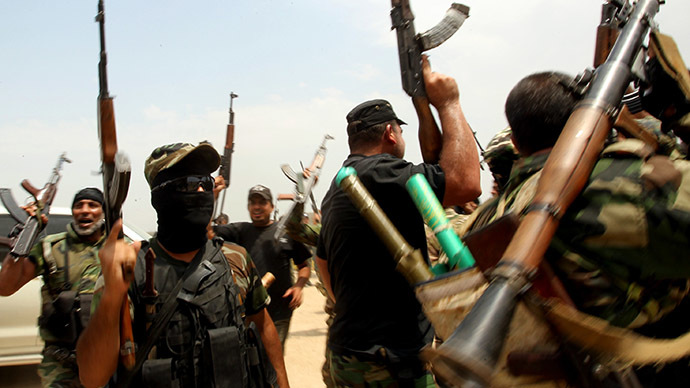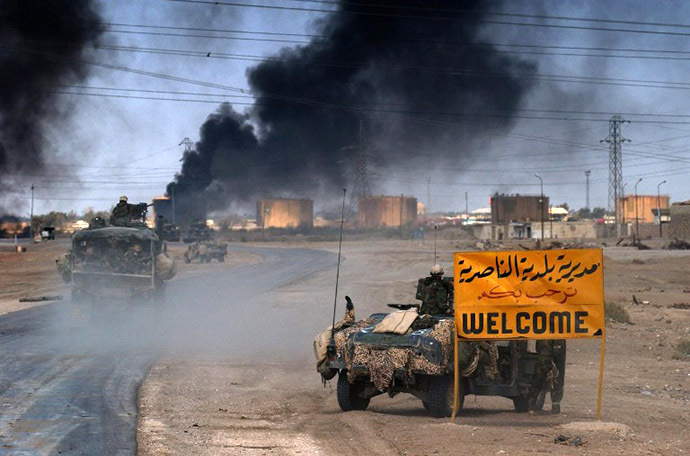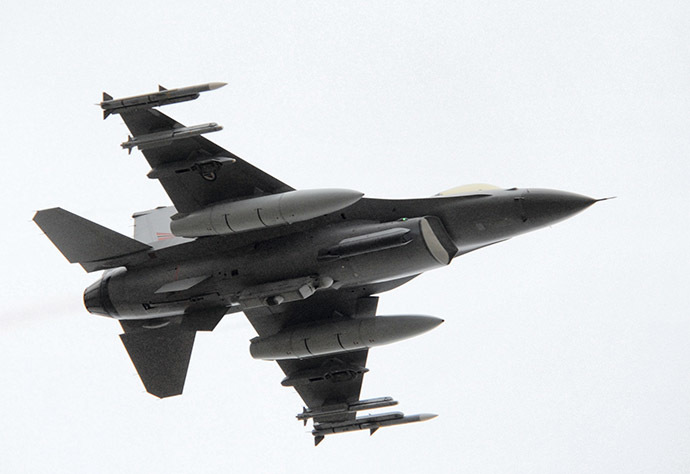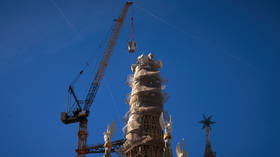‘Another wave of Western intervention threatens to pull Iraq apart’

The Obama administration’s recent decision to intervene in Iraq has seen the first US air strikes since the end of the American occupation in 2011, in response to the sweeping territorial gains made by militants belonging to the Islamic State group.
Two and a half years after the US military withdrew from the country, Barack Obama has pledged a renewed commitment to long-term military involvement in Iraq to counter the Islamic State’s self-declared caliphate, which has swallowed large swathes of northwestern Iraq and northern Syria.
Washington defended its renewed involvement in Iraq as being necessary to prevent the slaughter of the minority Yazidi and Christian religious communities, who fled their homes en masse as ISIS advanced. US forces did indeed provide thousands of gallons of clean water and packaged meals.
The administration’s altruism, though helpful in this case, appears highly selective, considering the subdued US response to the entrenched persecution of minorities in the region throughout the Western-backed war to topple the Syrian government over the past three and a half years.
The Obama administration’s strategic interests in the current scenario are undoubtedly grounded in bolstering the pro-American Kurdish peshmerga forces defending the semi-autonomous Kurdish region, where US energy firms such as ExxonMobil and Chevron have significant investment interests.
The United States has redeployed some 800 troops to Iraq since June, and has since conducted dozens of airstrikes in support of Kurdish peshmerga fighters and Iraqi Special Forces, who successfully retook a strategic dam near Mosul. The Iraqi army is now struggling to retake the town of Tikrit, some 130km north of Baghdad, where ISIS is firmly in control.
The specter of the Islamic State group and the appalling humanitarian crisis that Iraq finds itself marred in cannot be divorced from the legacy of the US invasion in 2003, as well as covert operations that have since been undertaken by the Obama administration to bolster rebel forces in Syria.
Following the Bush administration’s invasion of Iraq in 2003, Paul Bremer, then Governor of Iraq, entirely dismantled Iraq’s central government, state institutions, and armed forces with the stroke of a pen. Colonial divide and rule policies were put in place that saw the rise of Shiites into positions of power to offset the Sunnis thought to be loyal to Saddam Hussein.

Washington’s attempt at nation building fueled sectarian enmities as occupation authorities favored certain tribal groups and religious sects that were seen to be more advantageous and amenable to US interests, which inalterably and artificially restructured Iraqi society based on the dictates of neoconservative analysts and think-tanks, forcing Christians and other minorities to flee.
The political ascent of Prime Minister Nouri al-Maliki’s Shiite-led government was part and parcel of US policy that sought to offset the influence of the Sunni political forces. Washington did the opposite in Syria, backing Sunni Islamist militias to undermine President Bashar al-Assad, who belongs to the Alawite sect of Shia Islam.
Terrorist organizations such as al-Qaeda and other affiliated groups had no presence in Iraq or Syria before the US occupation, yet a sectarian explosion has taken place across the entire region since, hastened by the sweeping gains of radical jihadist groups operating in Syria.
The fighting in Syria is not a civil war per se, but a full-blown international conflict with arms and financing being meted by various intelligence agencies and governments who want to see regime change in Damascus. The Obama administration has funneled weapons, communications equipment, and other material support to Sunni militias in Syria since 2011, according to the New York Times, in addition to providing training, cash assets, and diplomatic backing.
The Islamic State has emerged as the most efficient, disciplined, and well-funded jihadist group in history precisely by virtue of its ability to flourish in the lawless space of northern Syria, a region continually destabilized by rebel militias who have been recipients of enormous funding and support from external forces. US allies such as Saudi Arabia, Qatar, and Turkey have played a significant role in aiding jihadist organizations in Syria.
The Obama administration has contributed multi-million dollar budgets to supply Syrian rebels with weapons, which have logically found their way into the hands of the most proficient fighters. When the Islamic State group captured the Iraqi city of Mosul earlier this summer, they did so with US-made equipment such as anti-tank weapons and RPGs, and have since captured Iraqi military equipment, also provided by the US.
US officials have preferred to shoulder the blame for this situation on the polarizing sectarian policies of al-Maliki’s government, but Western policies in Iraq and Syria have done far more to turn the region into a tinderbox. The unfolding horror of religious communities in northern Iraq could have even been avoided had US forces intervened or supplied Iraq with fighter jets when Maliki called for US support in June following the capture of Mosul.
Washington has long fallen out of favor with Maliki, who brought Iraq closer to Syria and Iran, and rejected American demands that any US military forces stationed in Iraq be shielded from prosecution or lawsuits. Maliki also opposed ExxonMobil’s oil exploration deal with the Kurds in northern Iraq, which was negotiated and signed directly with the US-backed Kurdish authorities without the approval of Baghdad.
Maliki visited Washington last fall with an urgent request that the US provide Baghdad with weaponry, including a long-delayed sale of F-16 fighter jets, which fell on deaf ears. As ISIS approached Baghdad, the Obama administration called on Maliki to step down before the US would honor Baghdad’s request for military assistance.

If the Obama administration allowed the Iraqis to purchase US weapons rather than use the situation to pressure Maliki to resign, Iraq could have provided air cover to protect Yazidis and Christians without relying on Washington, thereby greatly enhancing Baghdad’s ability to thwart the Islamic State’s advance.
In all likelihood, Washington’s decision to intervene was prompted by a realization the administration could effectively use the threat posed by the Islamic State as a shoehorn for achieving its strategic interests: ousting Maliki to bring in a leader more agreeable to the US, safeguarding vital economic interests in the Kurdish region, and reviving the push to launch airstrikes against Syria.
US officials have reportedly asked the Syrian opposition-in-exile to call on the international community to come to their aid by launching air strikes against both the Islamic State and the Syrian government forces, an indication that the Obama administration intends to reverse the gains of the Syrian army using airpower under the guise of beating back ISIS.
The scenario now unfolding can lead to a wider regional conflict, pitting Shiites, Sunnis, and Kurds against one another, effectively destroying Iraq.
The US and France, and most likely Israel, are now directly arming Kurdish forces, independently of the central government in Baghdad, which could embolden the territory’s separatist ambitions and hasten the partitioning of the Iraqi state.
Kurdistan’s US-aligned government, led by President Massoud Barzani, declared last month that the region would soon organize an independence referendum, which could lead to the formation of an independent state aligned to Washington and Tel Aviv, which has long maintained ties with the Kurds.
Haider al-Abadi has been slated to replace Maliki as Iraqi Prime Minister, and the new leadership faces enormous challenges. Abadi must prioritize reconciliation with the Sunnis, many of whom deeply resent the Shiite leadership and hold sympathetic views toward the Islamic State.
If the Kurdish regional government pushes ahead with independence, it would deprive the central government of key oil revenue and effectively guarantee continued infighting among Sunnis and Shiites as both vie for resources and political power, opening the door to Iraq’s fragmentation and demise.
If the countries that invaded and occupied Iraq in 2003 were serious about defeating the Islamic State group and their perverted and nihilistic fundamentalism, they must realize that this can only be accomplished through partnering with the legitimate governments in Damascus and Baghdad rather than undermining then.
The statements, views and opinions expressed in this column are solely those of the author and do not necessarily represent those of RT.
The statements, views and opinions expressed in this column are solely those of the author and do not necessarily represent those of RT.













